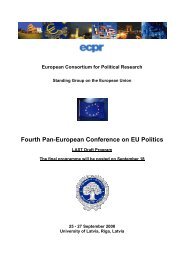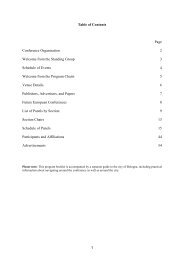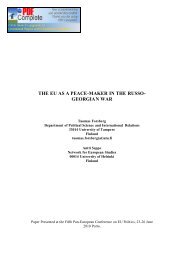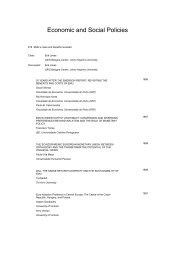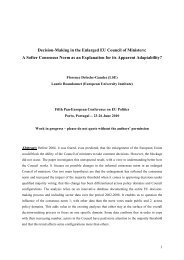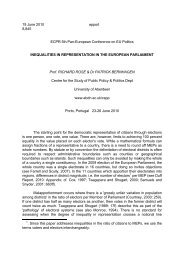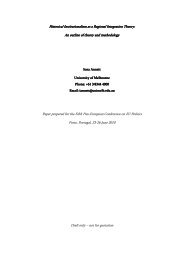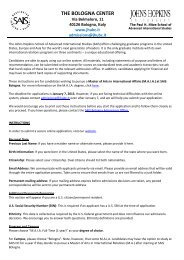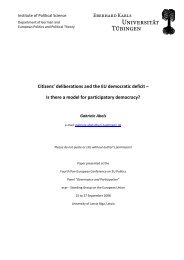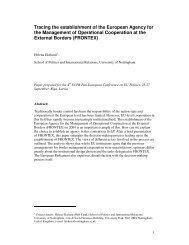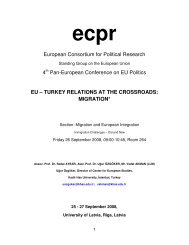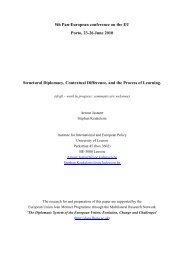Create successful ePaper yourself
Turn your PDF publications into a flip-book with our unique Google optimized e-Paper software.
30 SAIS BOLOGNA<br />
CURRICULUM 31<br />
INTERNATIONAL RELATIONS<br />
International Relations (IR) is a broad field that allows concentrations in specific areas for students<br />
wanting to specialize and general training for those wishing to achieve a wider appreciation of<br />
international politics. It teaches students the critical use of concepts as a basis for understanding<br />
and analyzing international relations. The field consists of a number of programs, and students may<br />
group their courses in any of these programs or choose courses from multiple programs. These<br />
programs are: Global Theory and History, International Law and Organization, Conflict Management,<br />
Energy, Resources and Environment, and Strategic Studies.<br />
Students concentrating in general International Relations, or in any of its specializations, take a<br />
total of six courses chosen from at least three distinct IR programs. For the student who chooses to<br />
concentrate in a specific program, either three or four courses are required in that program. <strong>Bologna</strong><br />
students concentrating in International Relations must take at least three IR courses in Washington,<br />
although there is no limit to the number of courses they may take in <strong>Bologna</strong>.<br />
Fall 2012<br />
Theories of International Relations<br />
(Cesa)<br />
Theory and Practice of International<br />
Peacekeeping<br />
(Kühne)<br />
War, Conflict and Democratization<br />
in Sub-Saharan Africa I<br />
(Kühne)<br />
Spring 2013<br />
Conflict Mediation and Dispute Resolution<br />
(Vendrell)<br />
Constitutional Development<br />
and Democratization<br />
(Frosini)<br />
Economic Migrants, Refugees<br />
and Human Security<br />
(Jessen-Petersen)<br />
Energy and Climate Change<br />
(van der Zwaan)<br />
European Foreign Policy<br />
(Missiroli)<br />
European Imperialism in the 20th Century<br />
(Gilbert)<br />
Foundations of International Law<br />
(Gestri)<br />
International Human Rights<br />
(Mancini)<br />
Risk in International Political Economy<br />
(Jones)<br />
Science, Technology and International<br />
Affairs<br />
(Keller)<br />
MARCO CESA<br />
is professor of International Relations,<br />
which he also teaches at the University of <strong>Bologna</strong>.<br />
He received his Ph.D. from Boston University.<br />
Professor Cesa is of the board of editors for<br />
Quaderni di scienza politica.<br />
His publications include Le ragioni della forza.<br />
Tucidide e la teoria della relazioni internazionali<br />
and Economia e Politica Internazionale:<br />
Introduzione alle teorie di International Political<br />
Economy. His most recent book, Allies yet Rivals:<br />
International Politics in 18th Century Europe<br />
(2010), was published by Stanford University Press.<br />
He has also written several journal articles<br />
on the theory of international relations<br />
and current issues in international politics.<br />
International Political Economy<br />
(Underhill)<br />
International Security Cooperation<br />
(Müller)<br />
Multiculturalism and the Human Rights<br />
of Women<br />
(Mancini)<br />
Peace and War<br />
(Gilbert)<br />
Policies and Politics<br />
of the American Emergency State<br />
(Unger)<br />
Politics and Economics<br />
of International Energy<br />
(Hafner)<br />
Principles and Practices<br />
of Conflict Management<br />
(Hopmann)<br />
Renewable Energy: Markets,<br />
Technologies & Projects<br />
(Dell’Aquila)<br />
WINRICH KÜHNE is the Steven Muller<br />
Professor in German Studies. His areas of<br />
expertise include German foreign policy, Africa,<br />
the Balkans and other regions as well as<br />
peacekeeping, crisis prevention, and conflict<br />
analysis. Kühne was the director of the<br />
German <strong>Center</strong> for International Peace<br />
Operations (ZiF) Berlin and deputy director of<br />
the German Research Institute for<br />
International and Security Affairs (SWP).<br />
He is consultant to the Association of<br />
European Parliamentarians (AWEPA)<br />
and member of the international advisory<br />
group to the UN Peacekeeping Lessons-<br />
Learned Unit. He is senior adviser to the<br />
former EU Crisis Prevention Network;<br />
member of the United Nations and Civilian<br />
Crisis Prevention Advisory Groups<br />
of the German Foreign Office;<br />
and member of the editorial boards of the<br />
Journal of International Peacekeeping<br />
and Global Governance. He has been an<br />
election observer in Malawi (1993),<br />
South Africa (1994), Mozambique (1994)<br />
and Bosnia and Herzegovina.



